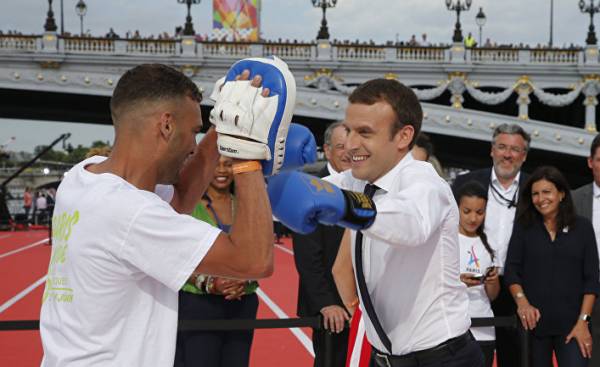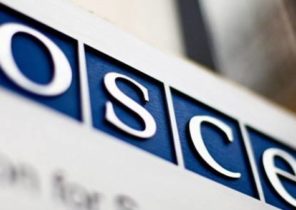
Emmanuel macron three months later. The head of state, the total for the year could pave the way to the Elysee Palace, not sitting idle at the beginning of the work in office. He gathered the Parliament in extraordinary session to take priority, in his opinion, the laws, and made many trips in France and abroad, to strengthen its legitimacy. The strategy was clearly defined from the beginning, but about its effectiveness, there are doubts.
Act 1: symbols of victory
You certainly remember his silhouette, which is a slow and confident step have moved to the stage at the pyramid of the Louvre, where a new President was to celebrate the victory. The tone was set. After a convincing victory in the second round against marine Le Pen Emmanuel macron was not going to play the card of “normal” President. He decided to focus on symbolism and to distance themselves from current Affairs.
A few weeks later representatives of the movement “Go Republic!” filled the benches of the National Assembly. During the year the movement of Emmanuel Macron has managed to become the most influential party in the country. It won an absolute majority in Parliament and became the richest party of France. To top it off, his drawing power has caused massive damage to the opposition. “Republicans” have split into two parts, one of which decided to take a “constructive” stance and support policies Makron. The socialist party, in turn, were pushed into the shadows, and her faction shrunk like shagreen leather. It remains only strike force “Recalcitrant France”, which periodically successfully declares itself an effective PR. The centrist Democratic movement, too, has never been so inclusive representation: all thanks to the arrangement of Emmanuel Macron, and françois Bayrou.
Act 2: the first success in the international arena
The President of the Republic on the move tried to assert itself in the international arena. Remember his firm handshake with Donald trump. And to hear from him in French and English criticism of the decision of the us leader to come out of the Paris climate agreement. The first case in the history of French politics. His “tweet,” “Make Our Planet Great Again” spread around the world.
In addition, the head of state received at Versailles Vladimir Putin. The response in the public opinion was positive. The ratings went up. In late June, 64% of French people have praised his work.
Act 3: new scandals
Candidate of the movement “Forward!” was represented by the increase of morality of public life as a priority, in particular after agreement with Bayrou. However, the picture soon was overshadowed by new scandals. Worth at least the situation with his right hand Richard Ferrand (Richard Ferrand), in respect of which an investigation was initiated. A week after his appointment as Minister of unity of territories at him a suspect in the “confusion of private and public interests” around the property Mutuelles de Bretagne. All this forced him to leave the government, leading the faction of “go Republic!” in the National Assembly.
The situation was difficult for Emmanuel Macron, as the sight was not only Richard Ferrand: in just four days the ship had to leave four Executive branch officials, including two Ministers. Then, suspicion about the bogus employment in “Democratic movement” forced françois Bayrou, Marielle de Sarno (Marielle de Sarnez), and Gular Sylvie (Sylvie Goulard) to hand over portfolios.
Recently on the front pages of Newspapers and was Minister of labour Muriel Panico (Murielle Pénicaud). An investigation was initiated on suspicion of favoritism in regard to Association Business France, which she led during the visit of Emmanuel Macron, the then Minister for Finance, in early 2016. Over the Executive power under threat of another trial.
Act 4: conflict with General de Villiers
Power involves difficult decisions. Emmanuel macron to quickly have experienced this in your own experience. The head of state is not left without attention the words of General de Villiers, who made criticism of the project reduction in the defense budget on July 12. The next day, the President made it clear that “some disputes should not stand in public” and recalled that the main here it is. During the parade on July 14, the President and the General were limited to dry hands. Five days later, de Villiers resigned.
Despite the apparent intransigence, Emmanuel macron, apparently, has heard the discontent of the General and his supporters. Four days after the resignation of de Villiers, the Minister of defense parley Florence (Florence Parly) announced unfreezing of 1.2 billion Euro loan from frozen in 2017 1.9 billion. In addition, during the visit to the airbase in Istres Emmanuel macron himself said that the defense budget will be the only one that will increase in 2018. Anyway, the incident left a mark in public opinion (presidential approval rating went significantly down) and showed the boundaries of the PR strategy of the Macron.
Act 5: housing subsidies
A few days after the controversy broke out already in the economic sphere. On 22 July, the government announced the reduction of housing subsidies for 5 Euro for all groups of recipients. The measures were criticized for their unfair character, because they beat all the residents regardless of their available resources. The Executive, in turn, claims that the decision does not come from her. She says that this measure was adopted in the framework of the plan of budget targets, in the current state does not have legal force. The Elysee Palace, in turn, keeps a deathly silence. Questions all invariably refer to their supervising Ministers in accordance with the position taken by Emmanuel macron, from the beginning of work in office.
Anyway, if you believe Le Canard Enchaîné, on 26 July, the President nevertheless called the measure “utter nonsense”. Can he veto it? In any case, on 2 August the Minister for territories, Jacques Mezar (Jacques Mézard) reported l’express that no decision can be taken without the approval of the President of the Republic.
The head of state had to pay dearly for their mistakes. Just over a month, his approval rating slipped by 10% (to 54%) — an unprecedented case in the history of the fifth Republic. After three months in office, Francois Hollande, who is called by his counterexample, could still boast a 56% rating. But we all know what happened next.







